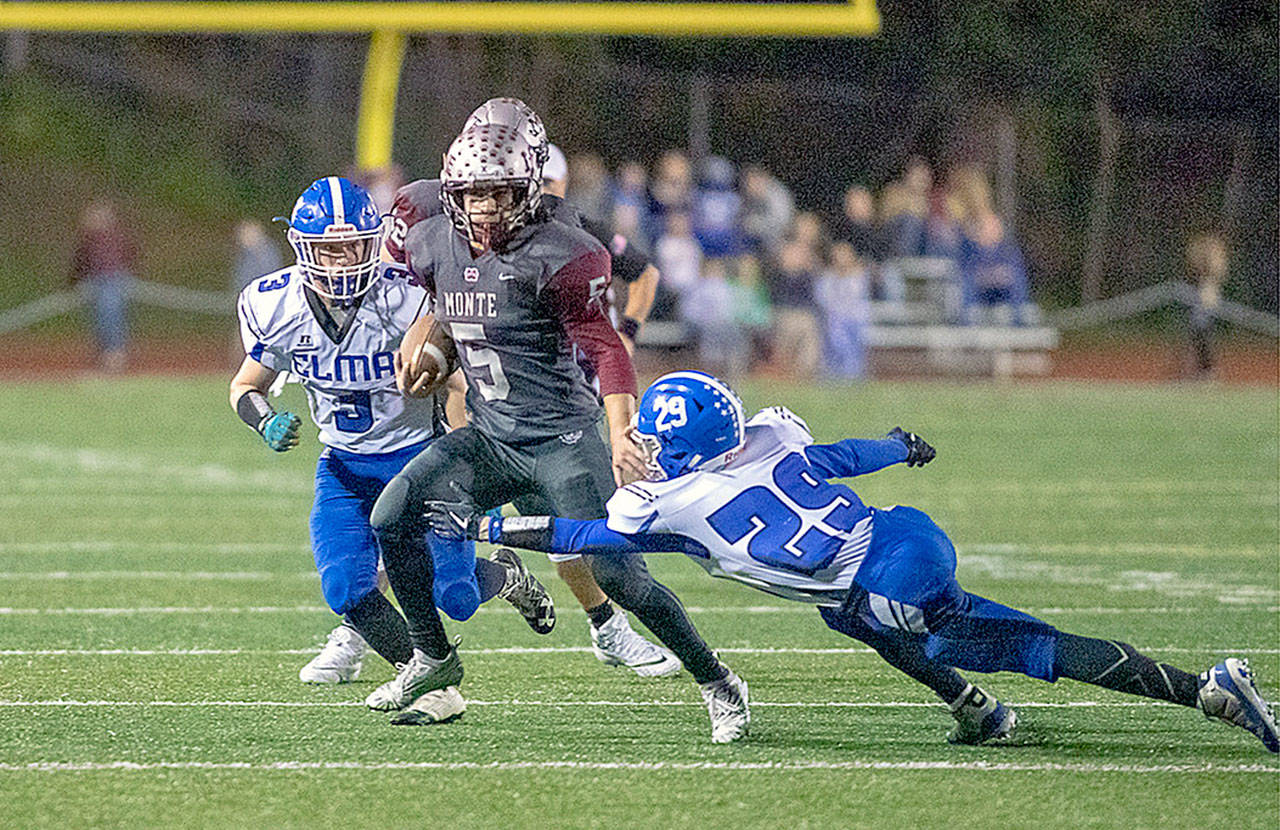By Rick Anderson
For the Grays Harbor News Group
With the state football playoffs approaching the semifinal round, it’s time to give a shoutout to the state seeding committees.
In their first year of operation, the committees have not only drawn the praise of an apparent majority of state coaches but have also been uncannily accurate in identifying the top teams in each classification.
This was particularly true in the upper divisions. The top four seeds all advanced to the Class 3A semifinals, while the No. 1, 2, 3 and 5 seeds filled out the 4A semis.
Tenth-seeded Newport, in the 1A class, was the lone double-digit seed in any division to win its first two state contests (including an upset of No. 2 Zillah last weekend). Newport would have been Hoquiam’s next opponent in a state semifinal battle of Grizzlies next weekend at Moses Lake had HHS made it past Lynden Christian in last Saturday’s quarterfinals. Lynden Christian, however, easily prevailed, 45-6.
One point I didn’t emphasize strongly enough in a previous column on this topic is that the state’s old bracket format for football, in which first-round pairings were pre-determined by district (District III No. 3 at District IV No. 1, for example), was badly broken and couldn’t be easily repaired.
Most districts rotated their seeds among their various leagues, regardless of a team’s quality.
Trico League champion Stevenson, for example, was blown out by Hoquiam, 49-0, in the opening round of the 1A playoffs. But the Bulldogs might well have received District IV’s top-seeded state berth under the previous format had it been the Trico’s turn for the higher seeds.
Unlike other sports, it isn’t feasible to play non-elimination state seeding games in football due to the high risk of injuries,
One further change I’d like to make in the football playoff system would be to minimize travel imbalances.
As it stands now, the 11th and 12th seeds in each classification have no opportunity of obtaining anything approaching a home playoff game, thanks to the long-standing policy of designating the bottom team in the brackets as the home club. That creates some potentially brutal postseason road trips.
In this year’s 2A class, for instance, 11th-seeded Prosser crossed the Cascade Mountains to face Tumwater in the opening round. Had the Mustangs from the Yakima Valley won that contest (which they didn’t), they would have traveled to Bellingham to face Lynden in the quarterfinals with the potential of two more cross-state treks — to Puyallup to face Fife in the semis and to the Tacoma Dome for the championship game.
That type of scenario should never happen, not when Meridian can advance to the 2017 state 1A title contest without ever leaving the confines of its home field in Bellingham during postseason play.
If a team facing at least a pair of 100-mile plus road trips survives the first one, it should be rewarded with a game close to home in the next round.
This type of flex scheduling has virtually zero chance of being implemented in the foreseeable future. A couple of administrators with whom I’ve discussed this plan displayed little interest in forfeiting potential home games for the sake of travel equity.
But if flexible playoff scheduling is a non-starter, the state seeding committee experiment should be a keeper.
~~~
A couple of fall sports questions to digest over Thanksgiving turkey:
Q — What was the Twin Harbors’ best feel-good sports story of the fall?
A — It has to be Aberdeen junior Annika Eisele capturing the state 2A 100-yard butterfly in girls swimming.
A phenom as a freshman, Eisele missed her entire sophomore season due to injury. The state title was a comeback in more ways than one. She rallied to outduel Olympic’s Chloe Partsch in a final so close than neither swimmer (according to Aberdeen coach Jan Simons) was certain who won until the results were posted.
Hoquiam’s unbeaten regular season in football and Elma’s football revival deserve notice, but my vote for the runner-up in this category goes to Ocosta’s volleyball team. Although boasting a traditionally solid volleyball program, the Wildcats took it to the next level this season by winning their league championship, placing second at district and earning only their second state berth since 1999.
Q — How does last month’s Montesano-Elma football game stack up among all-time East County Civil War classics?
A — First, a short disclaimer. Although a Monte-Elma match-up in 1972 was the first high school football game I ever covered, I’ve witnessed fewer Civil Wars than might be imagined. During my period as sports editor, I invariably covered the Aberdeen-Hoquiam game, so it seemed fair to assign Grays Harbor’s other big rivalry contest to my sports writing partner at the time.
Of the Civil Wars I’ve watched, however, Montesano’s seesaw 25-19 win last month ranked second in excitement to Elma’s 41-40 overtime triumph in the 1998 state semifinals. The latter was one of the most thrilling games I’ve ever covered — and perhaps the only one in which the losing team amassed more than 600 yards of total offense.
But last month’s edition was marred, to my mind, by an excess of critical penalties on both sides. Two could be classified as game-changing — a Bulldog roughing-the-passer infraction that wiped out a Sam Winter interception and eventually led to an Eagle touchdown and chop-block foul that helped prevent Elma from running out the clock and gave the Bulldogs the opening on which they capitalized.
Football officiating is tough to second-guess without the benefit of video replay (and I, for one, resent commentators raking officials over the coals only after they’ve viewed the fourth slow-motion replay from different angles). For all I know, the Monte-Elma infractions were correctly called.
But it’s never good when the losing team believes it was robbed — regardless of who wins.


